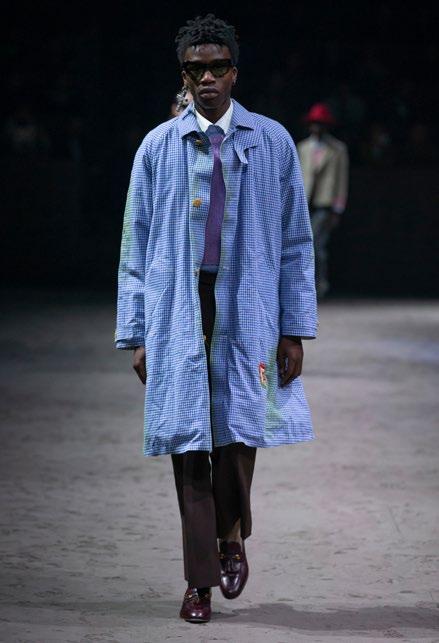
4 minute read
Turn Back Time


Advertisement



If there’s only one designer who can assertively claim to have shaken up menswear in recent times, it’s highly possible that he is Alessandro Michele. Challenging the traditional idea of masculinity, the Gucci Autumn/Winter 2020/2021 collection returns to childhood when gender code is a non-issue.
The innocent childlike scribble, “You are invited to my fifth birthday rave, Ale” on the French vintage postcard-style invitation serves to refresh the memory of every guest that 2020 is Alessandro Michele’s fifth anniversary as the creative director of the Italian house, while ever so discreetly announcing that the Gucci Autumn/ Winter 2020/2021 show is going to be a celebration to remember.

Instead of being nostalgic, Michele invites us to reminisce on an interesting period of time in everyone’s life as we reflect on the established norms of masculinity through a collection inspired by childhood, when there’s absolutely zero constraint on the dressing front. “Childhood is a free time, there are fewer labels [and] you can be yourself. When you grow up you are told ‘you can’t do that [because] you’re a boy and you’re going to primary school’” he was once quoted saying.
What Michele does here isn’t a stark contrast from what his past collections have been reverberating though. Since his debut show, he has been tabling the cloud of connotations surrounding the preconceived notions on inclusiveness. The first collection was soft yet powerful with a gender-fluid message – and the conversation continues in this collection conveying through pieces from preadolescence.
“In a patriarchal society, masculine gender identity is often moulded by violently toxic stereotypes. A dominant, winning, oppressive masculinity model is imposed on babies at birth. Attitudes, languages and actions end up progressively conforming to a macho virility ideal that removes vulnerability and dependence. Any possible reference to femininity is aggressively banned, as it is considered a threat against the complete affirmation of a masculine prototype that allows no divergencies,” the show note states.
“There is nothing natural in this drift. The model is socially and culturally built to reject anything that doesn’t comply with it. And this has very serious implications. Toxic masculinity, in fact, nourishes abuse, violence and sexism. And not only that. It condemns men themselves to conform to an imposed phallocratic virility in order to be socially accepted. In other words, toxic masculinity produces oppressors and victims at the same time.”
The collection includes a prim powder blue suit with knickerbockers, black leather school shoes and square metal bags and GG-patterned knee-high socks, as well as a gingham coat, a knitted sweater with the mantra “Mon petit chou” and a couple of low-slung jeans. There are also oversized knits, and a striking-looking leopard-print coat, metallic flares and grungy ’90s denim, as well as a couple pair of jeans appearing soiled by the unmistakable green bruising of grass stains: a perennial laundry-day challenge for parents of boys. The silent killer has got be the blue velvet blazer, especially so when it is finished off with a hard-to-miss earring.
Other highlights are comprised of bags with the word “fake” one the one side and “not” on the other, and T-shirts with the slogan “impotent/impatient” and “thank/think”. The tidy pair of Ultrapace R sneaker gets a makeover with a performance-inspired look, featuring a more modern tech composition – the type you can envisage making its mark on mainstream in the vein of the Rhyton. What about accessories? There’s everything from bolero hats to animal pins to diamond chandelier necklaces to sparkly gems.
For the Gucci Autumn/Winter 2020/2021 collection, it isn’t Michele’s intention to coerce us into revising and reconsidering our old, learned conception of masculinity. Instead, the creative director offers alternative interpretations about being a man in a world that is diverse and brimming with different elements because no matter how open-minded and socially conscious we think we are, it is our responsibility to not allow stereotype and prejudice influence our discernment process. “It’s not about suggesting a new normative model, rather to release who was constrained. Breaking a symbolic order, which is nowadays useless. Nourishing a space of possibility where masculine can shake its toxicity off, to freely regain what was taken away. And, in doing this, turning back time, learning to unlearn,” the note ended. And in this case, we reckon Michele appears to have successfully communicated his point of view with an array of gender-refuting garments.










